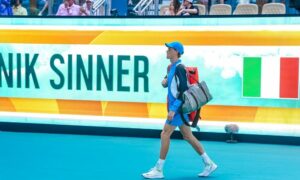On the eve of his debut at the Australian Open, Italian tennis player Jannik Sinner, the current world number 1, received the news that he will have to appear before the Court of Arbitration for Sport (CAS) in Lausanne, Switzerland. The athlete will have to respond to a doping case dating back to March 2023, when he tested positive for clostebol, a banned anabolic steroid. The hearing, scheduled for April 16 and 17, 2025, will be held behind closed doors and may determine the future of the tennis star in the professional circuit.
The case has caused a significant stir in the tennis world. Sinner, who secured important titles throughout 2024 and solidified his position as the world’s top-ranked player, claimed that the contamination was accidental. According to him, the banned substance was transferred to his body during a medical procedure performed by his physiotherapist. Despite the International Tennis Integrity Agency (ITIA) accepting the explanation and deciding not to apply a suspension, the World Anti-Doping Agency (WADA) appealed the decision, seeking a harsher punishment.
The situation places Sinner in a delicate position, as he prepares to defend his title at the first Grand Slam of the year while dealing with the pressure of these allegations. If found guilty, the tennis player could face a suspension of up to two years, which would be a significant blow to his career at its peak.
Martina Navrátilová, considered one of the best tennis players of all time, harshly attacks the world’s anti-doping system, saying it should be blown up and restarted again.
WADA should hunt down cheaters.#Sinner and #Swiatek obviously are not.@Martina 👏👏
Game, set, match 💥 pic.twitter.com/qRe1QEOikN— DDN10 ⚽🎾🌖 (@ddn10_) January 12, 2025
Details of the Accusation and the Case’s Background
Jannik Sinner’s doping case began in March 2023 during the Masters 1000 at Indian Wells. On that occasion, he tested positive for clostebol in two consecutive tests. The substance is used in medical treatments but is banned by WADA due to its anabolic effects, which can enhance athletic performance.
According to Sinner, the contamination occurred when his physiotherapist, Giacomo Naldi, applied a spray containing clostebol to a wound on his own finger. After the treatment, the physiotherapist performed massages on Sinner without wearing gloves, which allegedly resulted in the transfer of the substance to Sinner’s body. This explanation was accepted by the ITIA, which concluded that there was no intent to cheat on the part of the athlete.
However, WADA was not convinced by the justification and appealed to CAS. The agency argues that, even in cases of accidental contamination, the athlete is responsible for everything that enters their body, following the strict liability principle established in anti-doping regulations.
The Importance of the CAS Hearing
The hearing at the Court of Arbitration for Sport is seen as a decisive moment for Sinner’s future. The sports tribunal, based in Lausanne, is the final appeal body for doping-related cases. If the decision goes against the tennis player, he could be suspended for up to two years, which would have a devastating impact on his career and reputation.
On the other hand, a decision that upholds the Italian’s innocence could ease the pressure on him and reinforce his position as one of the top names in world tennis. The ruling could also set an important precedent for how accidental contamination cases are handled in sports.
The Impact of a Possible Suspension
If convicted, Sinner would face significant consequences. A two-year suspension would remove him from the circuit at the peak of his career, causing him to lose the top spot in the world rankings and valuable opportunities to win new titles.
Moreover, Sinner’s absence from major tournaments would hurt his finances, as he would miss out on prize money and sponsorships. Currently, the Italian is one of the highest-paid players on the circuit, with accumulated earnings exceeding $20 million in prize money and endorsement deals.
What is Clostebol and How Does Accidental Contamination Occur?
- What is Clostebol?
- Clostebol is an anabolic steroid used in medical treatments to accelerate wound healing and improve muscle recovery.
- Why is it banned?
- The substance is banned by WADA due to its potential to enhance athletic performance by increasing strength and physical endurance.
- How does accidental contamination occur?
- Contamination can occur through the use of creams or sprays containing clostebol. In Sinner’s case, the contact happened during a medical procedure performed by his physiotherapist.
Reactions from the Professional Circuit
Jannik Sinner’s case has sparked various reactions in the professional circuit. Some players expressed support for the Italian, emphasizing his integrity and professionalism. Others, such as Nick Kyrgios, advocated for a stricter stance on doping cases, regardless of the circumstances.
Players like Novak Djokovic and Rafael Nadal stressed the importance of conducting fair investigations and avoiding hasty judgments. They highlighted that an athlete’s reputation can be quickly destroyed by accusations that may later prove to be unfounded.
Doping Cases in Tennis
Tennis has seen several doping cases over the years. Some of the most notable cases include:
- Maria Sharapova: The Russian tennis star was suspended for 15 months after testing positive for meldonium in 2016.
- Marin Cilic: The Croatian player was suspended for four months in 2013 for using a contaminated supplement.
- Viktor Troicki: The Serbian player was suspended for one year in 2013 for refusing to take an anti-doping test.
These cases show that tennis has a strict anti-doping policy but also highlight the need to assess each situation individually.
Sinner’s Path to the Top of the Rankings
Jannik Sinner reached the top of the world rankings in 2024 after an impressive season that included titles in major tournaments such as the US Open and the Miami Masters. The Italian is known for his aggressive playing style and his ability to adapt to different surfaces, making him one of the most complete players on the circuit.
Born in 2001 in San Candido, Italy, Sinner began playing tennis as a child and quickly stood out for his talent and discipline. His rise to the top was meteoric, and he became the first Italian to reach the world number 1 ranking.
Sinner’s Upcoming Challenges
Despite the off-court controversies, Sinner remains focused on his preparation for the Australian Open, where he will face Chilean Nicolás Jarry in the first round. The tournament will be an opportunity for the Italian to showcase his mental strength and ability to overcome adversity.
The Grand Slam campaign will be closely followed by fans and experts eager to see how the tennis star handles the additional pressure caused by the doping case. Sinner’s performance in the tournament could directly influence his image and future in the sport.

On the eve of his debut at the Australian Open, Italian tennis player Jannik Sinner, the current world number 1, received the news that he will have to appear before the Court of Arbitration for Sport (CAS) in Lausanne, Switzerland. The athlete will have to respond to a doping case dating back to March 2023, when he tested positive for clostebol, a banned anabolic steroid. The hearing, scheduled for April 16 and 17, 2025, will be held behind closed doors and may determine the future of the tennis star in the professional circuit.
The case has caused a significant stir in the tennis world. Sinner, who secured important titles throughout 2024 and solidified his position as the world’s top-ranked player, claimed that the contamination was accidental. According to him, the banned substance was transferred to his body during a medical procedure performed by his physiotherapist. Despite the International Tennis Integrity Agency (ITIA) accepting the explanation and deciding not to apply a suspension, the World Anti-Doping Agency (WADA) appealed the decision, seeking a harsher punishment.
The situation places Sinner in a delicate position, as he prepares to defend his title at the first Grand Slam of the year while dealing with the pressure of these allegations. If found guilty, the tennis player could face a suspension of up to two years, which would be a significant blow to his career at its peak.
Martina Navrátilová, considered one of the best tennis players of all time, harshly attacks the world’s anti-doping system, saying it should be blown up and restarted again.
WADA should hunt down cheaters.#Sinner and #Swiatek obviously are not.@Martina 👏👏
Game, set, match 💥 pic.twitter.com/qRe1QEOikN— DDN10 ⚽🎾🌖 (@ddn10_) January 12, 2025
Details of the Accusation and the Case’s Background
Jannik Sinner’s doping case began in March 2023 during the Masters 1000 at Indian Wells. On that occasion, he tested positive for clostebol in two consecutive tests. The substance is used in medical treatments but is banned by WADA due to its anabolic effects, which can enhance athletic performance.
According to Sinner, the contamination occurred when his physiotherapist, Giacomo Naldi, applied a spray containing clostebol to a wound on his own finger. After the treatment, the physiotherapist performed massages on Sinner without wearing gloves, which allegedly resulted in the transfer of the substance to Sinner’s body. This explanation was accepted by the ITIA, which concluded that there was no intent to cheat on the part of the athlete.
However, WADA was not convinced by the justification and appealed to CAS. The agency argues that, even in cases of accidental contamination, the athlete is responsible for everything that enters their body, following the strict liability principle established in anti-doping regulations.
The Importance of the CAS Hearing
The hearing at the Court of Arbitration for Sport is seen as a decisive moment for Sinner’s future. The sports tribunal, based in Lausanne, is the final appeal body for doping-related cases. If the decision goes against the tennis player, he could be suspended for up to two years, which would have a devastating impact on his career and reputation.
On the other hand, a decision that upholds the Italian’s innocence could ease the pressure on him and reinforce his position as one of the top names in world tennis. The ruling could also set an important precedent for how accidental contamination cases are handled in sports.
The Impact of a Possible Suspension
If convicted, Sinner would face significant consequences. A two-year suspension would remove him from the circuit at the peak of his career, causing him to lose the top spot in the world rankings and valuable opportunities to win new titles.
Moreover, Sinner’s absence from major tournaments would hurt his finances, as he would miss out on prize money and sponsorships. Currently, the Italian is one of the highest-paid players on the circuit, with accumulated earnings exceeding $20 million in prize money and endorsement deals.
What is Clostebol and How Does Accidental Contamination Occur?
- What is Clostebol?
- Clostebol is an anabolic steroid used in medical treatments to accelerate wound healing and improve muscle recovery.
- Why is it banned?
- The substance is banned by WADA due to its potential to enhance athletic performance by increasing strength and physical endurance.
- How does accidental contamination occur?
- Contamination can occur through the use of creams or sprays containing clostebol. In Sinner’s case, the contact happened during a medical procedure performed by his physiotherapist.
Reactions from the Professional Circuit
Jannik Sinner’s case has sparked various reactions in the professional circuit. Some players expressed support for the Italian, emphasizing his integrity and professionalism. Others, such as Nick Kyrgios, advocated for a stricter stance on doping cases, regardless of the circumstances.
Players like Novak Djokovic and Rafael Nadal stressed the importance of conducting fair investigations and avoiding hasty judgments. They highlighted that an athlete’s reputation can be quickly destroyed by accusations that may later prove to be unfounded.
Doping Cases in Tennis
Tennis has seen several doping cases over the years. Some of the most notable cases include:
- Maria Sharapova: The Russian tennis star was suspended for 15 months after testing positive for meldonium in 2016.
- Marin Cilic: The Croatian player was suspended for four months in 2013 for using a contaminated supplement.
- Viktor Troicki: The Serbian player was suspended for one year in 2013 for refusing to take an anti-doping test.
These cases show that tennis has a strict anti-doping policy but also highlight the need to assess each situation individually.
Sinner’s Path to the Top of the Rankings
Jannik Sinner reached the top of the world rankings in 2024 after an impressive season that included titles in major tournaments such as the US Open and the Miami Masters. The Italian is known for his aggressive playing style and his ability to adapt to different surfaces, making him one of the most complete players on the circuit.
Born in 2001 in San Candido, Italy, Sinner began playing tennis as a child and quickly stood out for his talent and discipline. His rise to the top was meteoric, and he became the first Italian to reach the world number 1 ranking.
Sinner’s Upcoming Challenges
Despite the off-court controversies, Sinner remains focused on his preparation for the Australian Open, where he will face Chilean Nicolás Jarry in the first round. The tournament will be an opportunity for the Italian to showcase his mental strength and ability to overcome adversity.
The Grand Slam campaign will be closely followed by fans and experts eager to see how the tennis star handles the additional pressure caused by the doping case. Sinner’s performance in the tournament could directly influence his image and future in the sport.







